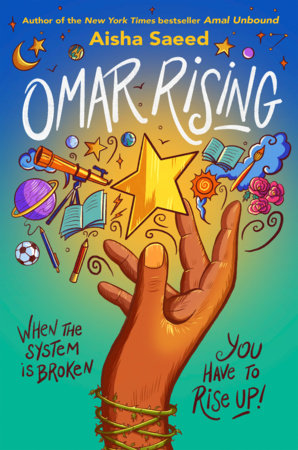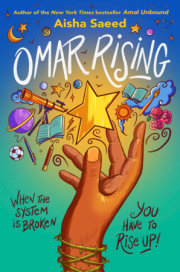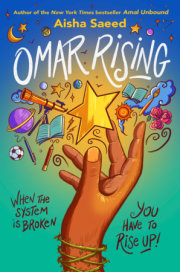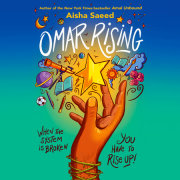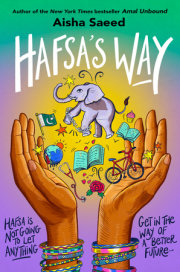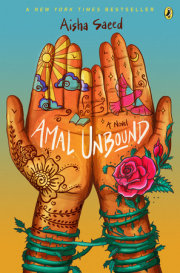Chapter 1 A gust of wind blows through the field as my friends and I wrap up our soccer game. It rustles through the neat rows of sugarcane growing behind us and sweeps over the orange trees in the distance.
“That does it!” Fuad shouts. He kicks the soccer ball toward me. “I’m never playing with either of you again. I mean it this time.”
“Don’t be such a sore loser,” Zaki responds. “It was a fun game.”
“Only because you and Omar cheated,” Fuad says, pointing at me.
I tilt my head. “Why is it whenever you win, it’s a hard-earned victory, but if anyone else does, they’re cheating?”
“Admit it,” Zaki says. “Omar’s last goal was epic.”
“Fine,” Fuad says grudgingly. “It wasn’t that bad.”
“I’ll take it.” I grin. Coming from Fuad, halfhearted praise is basically a standing ovation.
The soccer ball rolls until it settles next to my foot. As I kick it up to prop it under my arm, a wave of sadness washes over me. Fuad always vows never to play with us again, but this really is the last time I’ll be kicking the ball with him. There have been so many lasts lately. My last walk to the market yesterday. My last time feeding the chickens this morning. And tonight will be my last night sleeping in my own bed.
Tomorrow, everything will change. Tomorrow, I head to boarding school: the Ghalib Academy for Boys. Which means very soon my home, my village, and scrimmage games like these will no longer be part of my ordinary, everyday life.
It’s not that I don’t want to go. I filled out the forms myself. Asked my teacher for a recommendation. Sorted vegetables at the produce stand and cut sugarcane in the fields to save up for the application fee.
When I got the call, my mother’s eyes lit up like a thousand stars. She hugged me so tight I thought she’d never let go. The son of a servant getting a scholarship to a place like Ghalib? It opened up my world in ways I could only begin to imagine. Now better things are actually within reach, like college and a job that earns enough money to buy a home for my mother and me. A real home, with bedrooms and sofas and rugs, not a one-room space where we’ve strung up curtains that we pretend are walls. Ghalib is a once-in-a-lifetime opportunity to rewrite my destiny.
“Isn’t that Amal?” Zaki asks. He points toward the gravel road that slices through our village.
Following his gaze, I brighten. Fuad and Zaki are good friends, but Amal is like family. My mother works for her parents, and we live on their property, behind their house. Born three days apart, we’ve never known life without each other.
“Your mother asked me to find you,” Amal says when she approaches with two of her younger sisters in tow. “She said it was important.”
“Time for your partyyy!” Amal’s three-year-old sister sings out.
“Safa!” Amal grimaces.
“But don’t say anything,” says four-year-old Rabia, placing a finger solemnly on her lips. “It’s a surprise!”
“It’s okay.” I laugh, looking at Amal’s stricken expression. “Auntie Fozia asked me for a list of my favorite sweets the other day. And Fuad let it slip when we started playing.”
“No one can keep a secret except me, huh?” Amal exclaims.
“Nope. Never.” I shake my head.
“Everyone’s just excited for you,” says Zaki.
“Tell me about it.” Fuad rolls his eyes. “My dad won’t stop going on and on. ‘Why can’t you be more like Omar? You need to apply yourself.’ If I didn’t like you so much, I’d probably hate you.”
“I just got lucky.” I flush.
“There’s no lucky about it,” Amal says. “You earned it fair and square. Tomorrow will be amazing.”
“Tomorrow?” Zaki repeats. “But school doesn’t start till next week.”
“Ghalib starts a week earlier,” I remind him.
“So today really was the last soccer game?” Fuad’s expression falls.
“It’s not like I’m moving to Jupiter,” I say. “I’ll be back. Winter break. Summer—”
“Yeah,” Fuad interrupts. “But it won’t be . . .” His voice trails off.
But I know what he was going to say. And he’s right. It won’t be the same. Not even close.
“So, are you ready for the partyyy?” Amal teases as the six of us walk down the road toward her home.
“I tried all the sweets,” Safa says.
“The laddu was my favorite!” Rabia chimes in.
“Thanks for the taste-testing,” I tell them.
When we reach the front door, Amal looks at me. “Pretend to be surprised, okay? Please? Everyone’s so excited.”
“I’ll do my very best,” I promise.
But it isn’t hard to look surprised. As soon as Amal opens the door, my jaw drops. Her home is packed! Neighbors fill the main room and spill into the courtyard outside. Fairy lights are strung along the windows.
“There’s the man of the hour!” Auntie Fozia sings out. She stands beside a table covered with trays and trays of sweets.
Everyone claps and cheers.
“Wow.” I blink. “Thank you!”
“Great work, Omar.” Amal’s mother ruffles my hair.
“Always knew you could do it,” says another neighbor.
“That’s right.” Auntie Fozia nods. “Not every day someone from our village heads off to one of the most prestigious schools in Pakistan.”
“More like not ever,” her daughter Hafsa chimes in. “You’re the first to get into a school like that, but you won’t be the last!” The crowd laughs.
“Oh.” I shift. “I don’t—”
“It’s true.” Amal’s father, Uncle Imtiaz, smiles. “You carry all of our pride with you, Omar. Carry it well.”
Looking at everyone’s beaming faces, I’m filled with a warm glow. I thank my neighbors, then grab a plate and fill it with carroty gajrela, yellow laddus, and sticky-sweet jalebis. So many desserts I can’t fit them all on my plate—I’ll have to come back for seconds, maybe thirds! My friends and I settle at the edge of the open-air courtyard as Banu and Shamu, the two farm kittens, beeline straight for me. Shamu sidles up to me and purrs. Banu sniffs the sweets on my plate.
“Sorry,” I say. They know I’m usually reliable for sneaking them leftovers. “Pretty sure cats can’t have jalebis.”
Fuad picks up a round laddu. “All right. Who can catch this in their mouth?”
“What do I get if I do?” Zaki counters.
“Ultimate respect?” I suggest.
Fuad leans back and torpedoes the sweet at Zaki. It bounces against his nose before landing in his lap. We burst out laughing.
I glance at Amal refilling trays. The kittens at my feet. These people. This place. It’s all I’ve ever known. Soon, it will become a memory.
I know I’m leaving to make a new life—a better one—but I hate how beginnings have to be tied to endings. That in order to start the next part of my journey, I’ll have to leave all I know behind.
Chapter 2
“What a nice party,” my mother says the next day. She sits on a stool by our partly opened front door, mending an old sweater. “You did a good job pretending to be surprised.”
“Wait!” My eyes widen. “How’d you know I knew?”
“Nothing stays secret in this village.” She chuckles. “Least of all a party. Although I never let it slip, and you and I live together!”
I glance at my mother. This is the part I’ve tried not to think about. It’s been the two of us as long as I can remember. My father died soon after I was born. Once I leave, she’ll be alone.
Amal pokes her head around the door. “All packed?”
“I think so,” I tell her. “But I keep feeling like I’m forgetting something.”
“It’s okay if you do. My dad can always drop it off. The school isn’t that far away.”
“It’s far enough.”
“Only twenty kilometers,” my mother chimes in.
“May as well be two hundred. It’s too far to get home much. I won’t be back until winter break.”
“Probably for the best,” my mother says. “You’re there to focus on your studies. Not everyone gets this kind of opportunity.”
“People are desperate to get in,” Amal adds. “I’m thinking of applying to the girls’ school next fall. Hafsa’s working on her application now.”
“Iqra?” I look at her. “That’s great! Of course you should!”
“I’m only thinking about it,” Amal says quickly. “There’s a lot that needs to happen first, like seeing if I even get in and figuring out how we’d pay for it. It’s expensive.”
“Well, I think living inside a school would be the ultimate dream for you.”
“Very funny, Omar.”
“Who’s joking?” I grin. “And don’t get me wrong, I’m excited about Ghalib . . . I am.”
“You should be! And if you need us, we’ll be only a phone call away,” Amal says.
My stomach unclenches a little. This is true. Amal always knows the exact right thing to say to help me feel better.
“I’ll call every day,” I promise.
“Uh, every day?” She laughs. “I don’t think so. Between school, soccer, chess club, and whatever, you’re not going to have time to think of us, much less call.”
“Mr. Adeel said at orientation that the astronomy club is exploring exoplanets this year. I’m definitely joining that.”
“And soccer, for sure,” Amal says.
“Don’t know if I’ll make the cut. They won the regional championship last year.”
“But you’re so good!” Amal says. “How about archery? And robotics. I’d sign up for those if I were you.”
“Maybe all of the above?” I grin.
“Now, wait a second,” my mother interrupts. “You two sound like Safa in a candy shop.”
“It’s just exciting to have so many choices! But you know what I’m most jealous about?” Amal asks.
“Hmmm, I wonder. The library, maybe?”
“Don’t joke! You’re so lucky, Omar. I hear Ghalib’s library is enormous. Let’s pick a title and do a book club when you’re back for winter break.”
“Amal—”
“I’ll even let you pick a book on outer space or science fiction.”
“Amal, listen. I think our book-club days are over for a while,” I tell her. “I doubt I’ll have time to read for fun. Classes are supposed to be really hard.”
“You can try. If I could find time to read while catching up on an entire semester of school, you can squeeze a book or two in.”
I bite my lip. She’s right about that. Amal went through a terrible time this past year and had to drop out of school. Life only recently returned to normal for her, and she had to work so hard to catch up. The last person who needs to hear any complaints from me is her.
“Oh! I almost forgot.” I reach into my pocket and pull out a necklace. It’s a thin loop with a sparrow pendant. I saved up to buy it for Amal last month, but Safa immediately broke the clasp.
“You fixed it!” Amal exclaims.
“It wasn’t too hard. Your father lent me pliers, and I bent the broken bit back in place. The tough part will be making sure Safa doesn’t get her hands on it again.”
She looks down at the sparrow and then at me. Her expression grows clouded.
“I’m going to miss you,” she says.
“I’ll miss you, too.” I swallow.
“What’s with the long faces?” my mother asks. She stands and drapes an arm around each of us. “This is a new adventure. It’s what all of us have been hoping for.”
There’s a knock on our door. And then—
“Omar?” Uncle Imtiaz peeks in. “I’m ready when you are.”
I pick up my suitcase and step into the yard. The hot August sun beats against my skin. This same sun will be there to warm me at Ghalib, too.
Uncle’s motorcycle idles in the distance. My mother pulls me to her and hugs me. When we part, tears fill her eyes.
“I’m proud of you, Omar,” she says. “I can’t wait to see all you will do.”
“For us,” I tell her.
“For us.”
Copyright © 2022 by Aisha Saeed. All rights reserved. No part of this excerpt may be reproduced or reprinted without permission in writing from the publisher.

